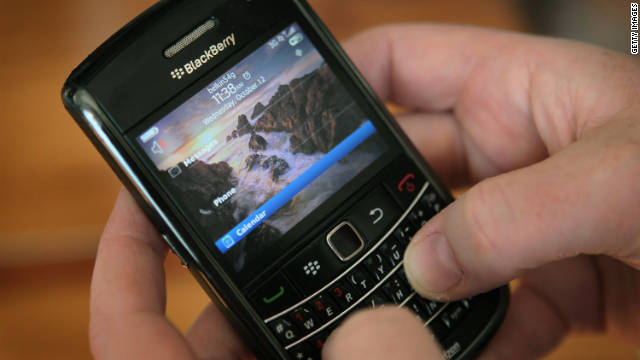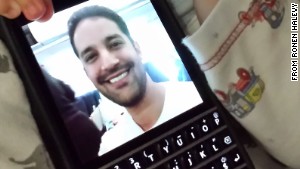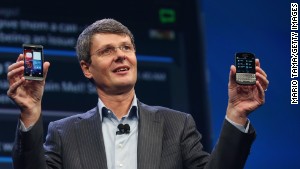- Back to Home »
- I'll never ditch my Blackberry

- Ronen Halevy is an information-security specialist who has owned a BlackBerry since 2005
- Despite the rise of flashier rival phones, he prefers BlackBerry's efficiency at e-mail
- Halevy: "BlackBerry puts my security first"
Editor's note: Ronen Halevy is founder and editor of BerryReview.com and has been covering BlackBerry and the mobile space since 2007. He is an avid technologist with experience in information security and enterprise IT and is usually active on Twitter.
(CNN) -- My BlackBerry is my lifeline.
My love story began with the 7290 model in 2005. With its blinking red notifications and QWERTY keyboard, it turned heads with intuitive and secure communication offered in an indestructible package.
Since then, I have not missed an upgrade as the BlackBerry brand defined what we now call the smartphone market.

It seems like only yesterday that I was riding the subway, surrounded by Type A New Yorkers punching away at their BlackBerrys. A constant companion for executives, the device was a status symbol.
Another view: Lusting after the new iPhone
But the years since have brought a string of disappointments for hyperconnected BlackBerry users like me, as the company tried dating out of its league. It lost focus on what made me fall for my CrackBerry in the first place.
You see, BlackBerry was trying to be something it wasn't. BlackBerry was the reliable but unassuming Volvo of smartphones. When it tried to compete head-on with the flashier Corvette, it began to unravel.
Over the years, as each of my friends moved to iPhone or Android, I noticed that they no longer replied from their mobiles because it was a chore. This is a symptom of platforms that put content consumption over creation. In other words, those phones were fine for reading blogs or watching video, but they were not so good at sending e-mails.
 A history of Blackberry in 93 seconds
A history of Blackberry in 93 seconds  BlackBerry battles for survival
BlackBerry battles for survival Soon enough, I was forced to carry an Android phone as well, as BlackBerry was slow to adopt 3G/4G connectivity and other ancillary features. But I could not forgo BlackBerry's core competency of efficient communication. I've worked in information security for years, and I place a high value on the encryption and secure communication baked into each BlackBerry device.
In an age where companies are turning your personal life into an open book, BlackBerry puts my security first.
The easiest way to describe what makes BlackBerry communications special compared with Android and iOS is the universal inbox called "The Hub" on BlackBerry 10, the phones' latest operating system. In one screen, BlackBerry lets you view and search every single communication service you have on your phone, AND it lets you act on them without opening another application.
That means my e-mail, Twitter, IM/BBM, Facebook, calendar, notifications and more are all in one place. On Android and iOS I would be viewing my latest notifications and then opening each separate app to respond.
BlackBerry's current CEO, Thorsten Heins, promised to refocus the company on "hyperconnected multitasking achiever people" like me when he took the helm in 2012. BlackBerry 10 managed to rekindle this core competency while offering a platform that was cutting-edge and offered a larger catalog of top shelf apps.

Sadly, most of the former BlackBerry users I hear from do not realize that BlackBerry 10 is a whole new platform that addresses most of the shortcomings (no browser, shortage of apps, etc.) that led them to abandon BlackBerry in the past. This is where Heins and his executive team failed. The cloud of doom and uncertainty that they leave hanging over the company also keeps potential adopters away from BlackBerry 10.
Now, when people see me carrying my new Q10 phone, they are surprised that BlackBerry is still around. And when l pull out my BlackBerry in public, I feel the need to defend it. (I still carry an Android device as well.)
BlackBerry 10 is a promising platform, but it has not reached the market penetration required to convince companies like my bank, Chase, to release an app for me to cash checks. This is the inherent problem with the situation BlackBerry finds itself in.
Between strong iOS and Android offerings and BlackBerry's poor job of marketing, people know almost nothing about what BlackBerry 10 offers and how it differs from older BlackBerrys they were given years ago at work. Many people are surprised to learn that BlackBerry actually has a competitive touchscreen smartphone.
BlackBerry's latest financial woes and the uncertainty of Fairfax Financial taking the company private has created more anxiety for those of us still clinging to our BlackBerrys. For future owners of BlackBerry to have any chance of success, they must stop trying to compete directly with other platforms and instead focus on why us hyperconnected, multitasking achievers should choose them instead.
I truly hope they succeed.
The views expressed in this commentary are solely those of Ronen Halevy.







